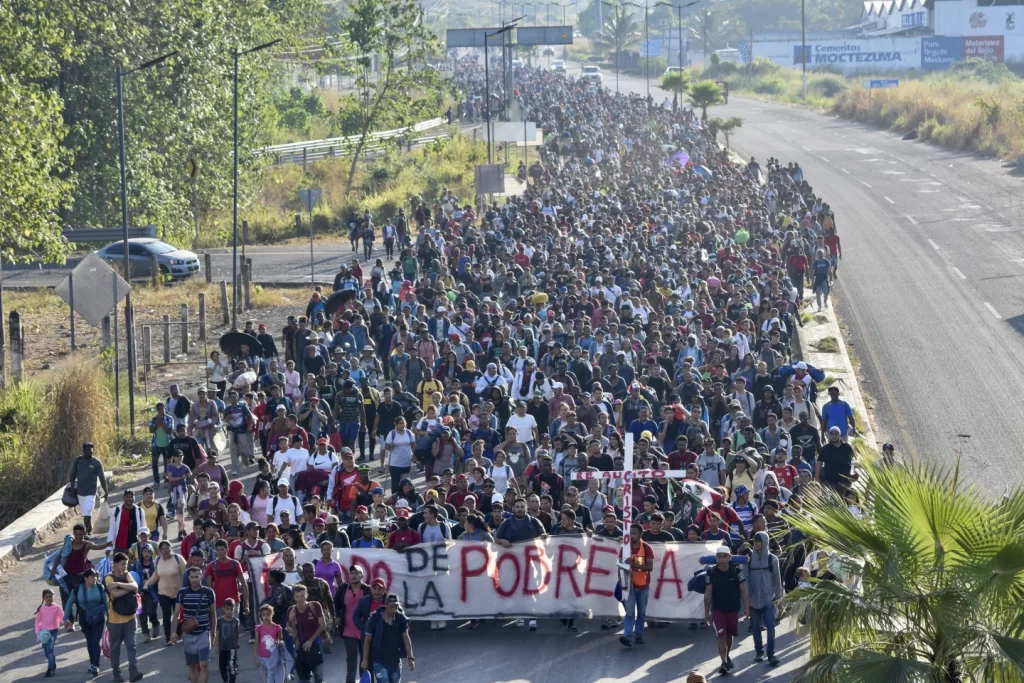
TAPACHULA, Mexico — A sprawling caravan of migrants from Central America, Venezuela, Cuba and other countries trekked through Mexico on Sunday, heading toward the U.S. border. The procession came just days before Secretary of State Antony Blinken arrives in Mexico City to hammer out new agreements to control the surge of migrants seeking entry into the United States.
The caravan, estimated at around 6,000 people, many of them families with young children, is the largest in more than a year, a clear indication that joint efforts by the Biden administration and President Andrés Manuel López Obrador’s government to deter migration are falling short.
The Christmas Eve caravan departed from the city of Tapachula, near the country’s southern border with Guatemala. Security forces looked on in what appeared to be a repeat of past tactics when authorities waited for the marchers to tire out and then offered them a form of temporary legal status that is used by many to continue their journey northward.
“We’ve been waiting here for three or four months without an answer,” said Cristian Rivera, traveling alone, having left his wife and child in his native Honduras. “Hopefully with this march there will be a change and we can get the permission we need to head north.”
López Obrador in May agreed to take in migrants from countries such as Venezuela, Nicaragua and Cuba turned away by the U.S. for not following rules that provided new legal pathways to asylum and other forms of migration.
But that deal, aimed at curbing a post-pandemic jump in migration, appears to be insufficient as the number of migrants once again surges, disrupting bilateral trade and stoking anti-migrant sentiment among conservative voters in the U.S.
This month, as many as 10,000 migrants were arrested per day at the U.S. southwest border. Meanwhile, U.S. Customs and Border Protection had to suspend cross-border rail traffic in the Texas cities of Eagle Pass and El Paso as migrants were riding atop freight trains.
Arrests for illegal crossing topped 2 million in each of the U.S. government’s last two fiscal years, reflecting technological changes that have made it easier for migrants to leave home to escape poverty, natural disasters, political repression and organized crime.
On Friday, López Obrador said he was willing to work again with the U.S. to address concerns about migration. But he also urged the Biden administration to ease sanctions on leftist governments in Cuba and Venezuela — where about 20% of 617,865 migrants encountered nationwide in October and November hail from — and send more aid to developing countries in Latin America and beyond.
“That is what we are going to discuss, it is not just contention,” López Obrador said at a press briefing Friday following a phone conversation the day before with President Joe Biden to pave the way for the high level U.S. delegation.
The U.S. delegation, which will meet the Mexican president on Wednesday, will also include Homeland Security Secretary Alejandro Mayorkas and White House homeland security adviser Liz Sherwood-Randall.
Mexico’s ability to assist the U.S. may be limited, however. In December, the government halted a program to repatriate and transfer migrants inside Mexico due to a lack of funds. So far this year, Mexico has detected more than 680,000 migrants living illegally in the country, while the number of foreigners seeking asylum in the country has reached a record 137,000.
Sunday’s caravan was the largest since June 2022, when a similarly sized group departed as Biden hosted leaders in Los Angeles for the Summit of the Americas. Another march departed Mexico in October, coinciding with a summit organized by López Obrador to discuss the migration crisis with regional leaders. A month later, 3,000 migrants blocked for more than 30 hours the main border crossing with Guatemala.



